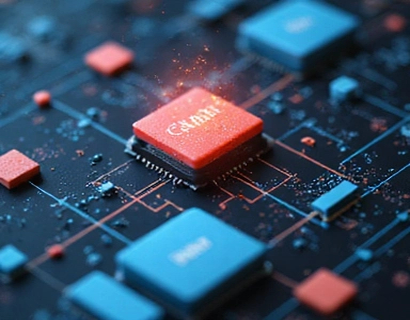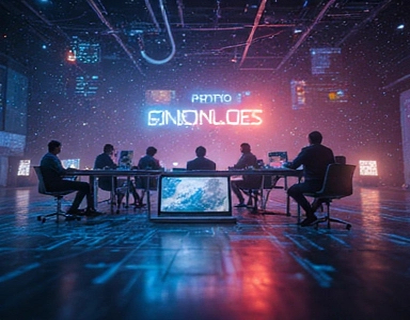Smart Contracts and Management Tools: Revolutionizing Governance for Enhanced Democracy and Participation
In recent years, the intersection of technology and governance has given rise to innovative solutions aimed at transforming traditional democratic processes. Among these, smart contracts and advanced management tools stand out as pivotal elements in creating a more accessible, efficient, and participatory form of governance. This article delves into the transformative potential of these technologies, exploring how they can streamline decision-making, enhance transparency, and boost community engagement, ultimately fostering a more universal and inclusive democracy.
The Role of Smart Contracts in Governance
Smart contracts are self-executing contracts with the terms of the agreement directly written into code. They run on blockchain technology, a decentralized and immutable ledger that ensures transparency and security. In the context of governance, smart contracts can automate and enforce the execution of agreements and policies, reducing the need for intermediaries and minimizing the potential for human error or manipulation.
One of the most significant advantages of smart contracts in governance is their ability to enforce rules and regulations automatically. For instance, in the realm of public procurement, smart contracts can ensure that all bids are evaluated based on predefined criteria, and the winner is selected and paid automatically once the conditions are met. This not only speeds up the process but also increases accountability and reduces the scope for corruption.
Enhancing Transparency through Blockchain
Transparency is a cornerstone of democratic governance, and blockchain technology, which underpins smart contracts, plays a crucial role in achieving this. The immutable nature of blockchain ensures that once a transaction or contract is recorded, it cannot be altered or deleted. This provides a tamper-proof record of all governance activities, from budget allocations to policy implementations.
Citizens can access this information in real-time, gaining insights into how their government operates. This level of transparency builds trust and fosters a more informed citizenry. For example, in the context of public finances, blockchain can track the flow of funds, from tax collection to expenditure, ensuring that every transaction is visible and verifiable. This reduces the risk of misappropriation and enhances public confidence in government institutions.
Streamlining Decision-Making Processes
Smart contracts and blockchain technology can significantly streamline decision-making processes in governance. By automating routine tasks and ensuring that decisions are based on predefined rules, these tools can reduce bureaucratic delays and improve efficiency. For instance, in the context of voting systems, smart contracts can facilitate secure and transparent electronic voting, reducing the time and resources required for traditional voting processes.
Moreover, smart contracts can be designed to trigger specific actions based on certain conditions being met. For example, in urban planning, a smart contract can automatically release funds for a construction project once the necessary permits are approved and the project milestones are achieved. This not only accelerates the process but also ensures that funds are used appropriately and in line with the agreed-upon terms.
Boosting Community Engagement
One of the most promising aspects of smart contracts and management tools is their potential to boost community engagement in governance. By providing a platform for transparent and automated decision-making, these tools can encourage more citizens to participate in the democratic process. When people see that their contributions and votes are recorded and executed fairly, they are more likely to engage actively.
For example, local governments can use smart contracts to facilitate participatory budgeting, where citizens directly decide how a portion of the public budget is spent. Through a blockchain-based platform, citizens can propose, vote on, and track the implementation of budget items. This not only increases transparency but also empowers citizens, making them feel more connected to the governance process.
Innovative Management Tools for Effective Governance
Beyond smart contracts, innovative management tools are playing a crucial role in enhancing governance. These tools leverage data analytics, artificial intelligence, and user-friendly interfaces to provide government officials and citizens with actionable insights and efficient services.
Data analytics tools can process large volumes of data to identify trends, predict outcomes, and inform policy decisions. For instance, by analyzing traffic patterns, city planners can optimize public transportation routes and schedules, reducing congestion and improving mobility. Similarly, health departments can use data analytics to monitor disease outbreaks and allocate resources more effectively.
Artificial intelligence (AI) can further enhance governance by automating complex tasks and providing intelligent recommendations. AI-powered chatbots can handle citizen inquiries, providing instant and accurate responses. AI can also assist in fraud detection by analyzing patterns and flagging suspicious activities in real-time.
Case Studies: Successful Implementations
Several regions and organizations have already begun to implement smart contracts and management tools to revolutionize their governance structures. One notable example is the city of Zug in Switzerland, often referred to as the "Crypto Valley," which has adopted blockchain technology to streamline its administrative processes. The city uses blockchain-based solutions for property registries, voting systems, and public services, enhancing transparency and efficiency.
Another example is the Estonian government, which has been a pioneer in digital governance. Estonia's e-Residency program allows non-citizens to access Estonian digital services, including voting, through a secure and transparent blockchain-based system. This has not only improved governance but also attracted international attention and investment.
Challenges and Considerations
While the potential of smart contracts and management tools in governance is significant, there are several challenges and considerations that need to be addressed. One of the primary concerns is the technical complexity and the need for a skilled workforce to develop and maintain these systems. Governments and organizations must invest in training and education to build the necessary expertise.
Another challenge is ensuring cybersecurity and protecting against potential vulnerabilities in blockchain and smart contract systems. While blockchain is inherently secure, the interfaces and applications built on top of it can be susceptible to attacks. Robust security measures and continuous monitoring are essential to mitigate these risks.
Additionally, there is a need to address legal and regulatory frameworks to support the adoption of smart contracts in governance. Existing laws may not fully accommodate the unique characteristics of smart contracts, and new regulations may be required to ensure their legal validity and enforceability.
The Path Forward
The integration of smart contracts and management tools in governance represents a significant step towards more transparent, efficient, and participatory democracy. By automating processes, enhancing transparency, and boosting community engagement, these technologies can help overcome many of the challenges faced by traditional governance systems.
For individuals and organizations interested in pioneering new governance solutions, embracing these technologies is crucial. By leveraging smart contracts and innovative management tools, they can contribute to creating a more inclusive and effective democratic process. The future of governance is digital, and those who adapt will lead the way in shaping a better, more participatory world.











































